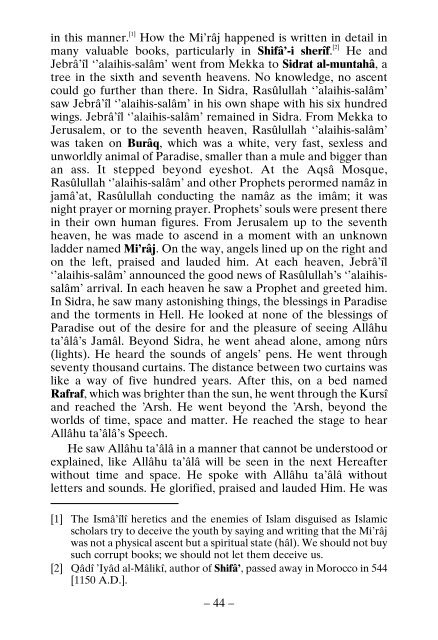Belief and Islam
BELIEF AND ISLAM star This work, Belief and Islam, originally was written in Persian under the title I’tiqâd-nâma by Hadrât Mawlânâ Khâlid al-Baghdâdî, a profound ‘âlim of Islam and a specialist in ma’ârif of tasawwuf. Hâji Faydullah Effendi of Kemah, a khalîfa of great walî Mavlânâ Mahmûd Sâhib, the brother of the author, translated the book into Turkish and named it Farâid-ul-fawâid which was printed in Istanbul in 1312 A.H.[1894]. Our bookstore had it translated again from the Persian original into Turkish and, some explanations and three chapters, published it with the title Imân ve Islâm in 1966. German, French and Arabic versions are also published by our bookstore. This book, explains five fundamentals of Islam, six fundamentals of îmân and the contemporary information about the matter and refutes those who are against Islam and those who are lâ-madbhabî.
BELIEF AND ISLAM
star This work, Belief and Islam, originally was written in Persian under the title I’tiqâd-nâma by Hadrât Mawlânâ Khâlid al-Baghdâdî, a profound ‘âlim of Islam and a specialist in ma’ârif of tasawwuf. Hâji Faydullah Effendi of Kemah, a khalîfa of great walî Mavlânâ Mahmûd Sâhib, the brother of the author, translated the book into Turkish and named it Farâid-ul-fawâid which was printed in Istanbul in 1312 A.H.[1894]. Our bookstore had it translated again from the Persian original into Turkish and, some explanations and three chapters, published it with the title Imân ve Islâm in 1966. German, French and Arabic versions are also published by our bookstore. This book, explains five fundamentals of Islam, six fundamentals of îmân and the contemporary information about the matter and refutes those who are against Islam and those who are lâ-madbhabî.
Create successful ePaper yourself
Turn your PDF publications into a flip-book with our unique Google optimized e-Paper software.
in this manner. [1] How the Mi’râj happened is written in detail in<br />
many valuable books, particularly in Shifâ’-i sherîf. [2]<br />
He <strong>and</strong><br />
Jebrâ’îl ‘’alaihis-salâm’ went from Mekka to Sidrat al-muntahâ, a<br />
tree in the sixth <strong>and</strong> seventh heavens. No knowledge, no ascent<br />
could go further than there. In Sidra, Rasûlullah ‘’alaihis-salâm’<br />
saw Jebrâ’îl ‘’alaihis-salâm’ in his own shape with his six hundred<br />
wings. Jebrâ’îl ‘’alaihis-salâm’ remained in Sidra. From Mekka to<br />
Jerusalem, or to the seventh heaven, Rasûlullah ‘’alaihis-salâm’<br />
was taken on Burâq, which was a white, very fast, sexless <strong>and</strong><br />
unworldly animal of Paradise, smaller than a mule <strong>and</strong> bigger than<br />
an ass. It stepped beyond eyeshot. At the Aqsâ Mosque,<br />
Rasûlullah ‘’alaihis-salâm’ <strong>and</strong> other Prophets perormed namâz in<br />
jamâ’at, Rasûlullah conducting the namâz as the imâm; it was<br />
night prayer or morning prayer. Prophets’ souls were present there<br />
in their own human figures. From Jerusalem up to the seventh<br />
heaven, he was made to ascend in a moment with an unknown<br />
ladder named Mi’râj. On the way, angels lined up on the right <strong>and</strong><br />
on the left, praised <strong>and</strong> lauded him. At each heaven, Jebrâ’îl<br />
‘’alaihis-salâm’ announced the good news of Rasûlullah’s ‘’alaihissalâm’<br />
arrival. In each heaven he saw a Prophet <strong>and</strong> greeted him.<br />
In Sidra, he saw many astonishing things, the blessings in Paradise<br />
<strong>and</strong> the torments in Hell. He looked at none of the blessings of<br />
Paradise out of the desire for <strong>and</strong> the pleasure of seeing Allâhu<br />
ta’âlâ’s Jamâl. Beyond Sidra, he went ahead alone, among nûrs<br />
(lights). He heard the sounds of angels’ pens. He went through<br />
seventy thous<strong>and</strong> curtains. The distance between two curtains was<br />
like a way of five hundred years. After this, on a bed named<br />
Rafraf, which was brighter than the sun, he went through the Kursî<br />
<strong>and</strong> reached the ’Arsh. He went beyond the ’Arsh, beyond the<br />
worlds of time, space <strong>and</strong> matter. He reached the stage to hear<br />
Allâhu ta’âlâ’s Speech.<br />
He saw Allâhu ta’âlâ in a manner that cannot be understood or<br />
explained, like Allâhu ta’âlâ will be seen in the next Hereafter<br />
without time <strong>and</strong> space. He spoke with Allâhu ta’âlâ without<br />
letters <strong>and</strong> sounds. He glorified, praised <strong>and</strong> lauded Him. He was<br />
[1] The Ismâ’îlî heretics <strong>and</strong> the enemies of <strong>Islam</strong> disguised as <strong>Islam</strong>ic<br />
scholars try to deceive the youth by saying <strong>and</strong> writing that the Mi’râj<br />
was not a physical ascent but a spiritual state (hâl). We should not buy<br />
such corrupt books; we should not let them deceive us.<br />
[2] Qâdî ’Iyâd al-Mâlikî, author of Shifâ’, passed away in Morocco in 544<br />
[1150 A.D.].<br />
– 44 –

















